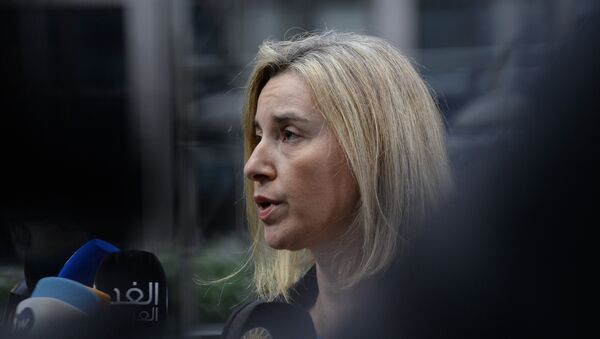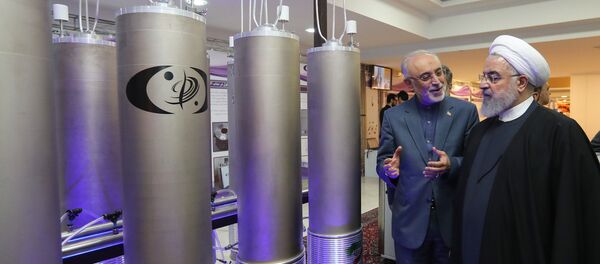Avoiding a military escalation would be the most responsible approach towards Iran, EU foreign ministers told US Secretary of State Mike Pompeo on Monday during an impromptu trip to Brussels to discuss the recent tensions with Tehran.
“Mike Pompeo heard that very clearly today from us, not only from myself, but also from other ministers of EU member states, that we are living in a crucial delicate moment, where the most relevant attitude to take, the most responsible attitude to take is, and we believe should be, [that] of maximum restraint and avoiding any escalation on the military side”, EU foreign policy chief Federica Mogherini told reporters following a meeting with the bloc’s foreign ministers on how to preserve the Iran nuclear deal.
While Brussels has called for restraint, Pompeo, who abruptly cancelled his visit to Russia on Monday to hold talks in Brussels instead, shared information about “escalating” threats from Iran, as US Special Representative for Iran Brian Hook told the press.
“Iran is an escalating threat and this seemed like a timely visit on his way to Sochi. The secretary wanted to share some details behind what we have been saying publicly. We believe that Iran should try talks instead of threats. They have chosen poorly by focusing on threats”, Hook said, referring to Pompeo’s scheduled visit to Russia on Tuesday for meetings with President Vladimir Putin and Foreign Minister Sergei Lavrov.
Reports, meanwhile, keep flooding in that Spain’s Defence Minister Margarita Robles has ordered the “temporary measure of withdrawal of the frigate Méndez Núñez (F-104) from the combat group of the aircraft carrier Abraham Lincoln while it is in the Middle East".
The decision is said to have been made during a meeting of EU defence ministers on Monday, with ABC journalists assuming that it may trigger a diplomatic crisis between Spain and the US.
The developments follow an announcement by Iranian President Hassan Rouhani on 8 May that Tehran would partially suspend its commitments under the Joint Comprehensive Plan of Action, commonly referred to as the Iran nuclear deal. Rouhani set a 60-day deadline for the five remaining signatories to the deal — France, Germany, the UK, Russia, and China — to ensure Iran’s interests are protected under the agreement or else the country would resume enriching uranium at higher levels.
Over the past few weeks tensions between the US and Iran have reached a boiling point, with Washington deploying an aircraft carrier strike group and bomber task force to the Persian Gulf in what has been described as a “clear and unmistakable” message to Tehran.
READ MORE: Pompeo to Meet Russia's Putin, Lavrov in Sochi to Discuss Venezuela, Iran
The US has also designated Iran’s Islamic Revolutionary Guard Corps (IRGC) as a terrorist organisation, while Pompeo has accused Iran of targeting US forces in Syria and Iraq. He’s also blamed Tehran for the deaths of hundreds of US service members. The move prompted Tehran to recognise US CENTCOM as a terrorist group in response.
On 8 May 2018, the United States withdrew from the 2015 nuclear deal, which implied lifting anti-Tehran sanctions in exchange for Iran maintaining the peaceful nature of its nuclear programme. Washington has also re-imposed all sanctions and imposed new ones, with a stated goal of bringing down Iran's oil exports to zero.



